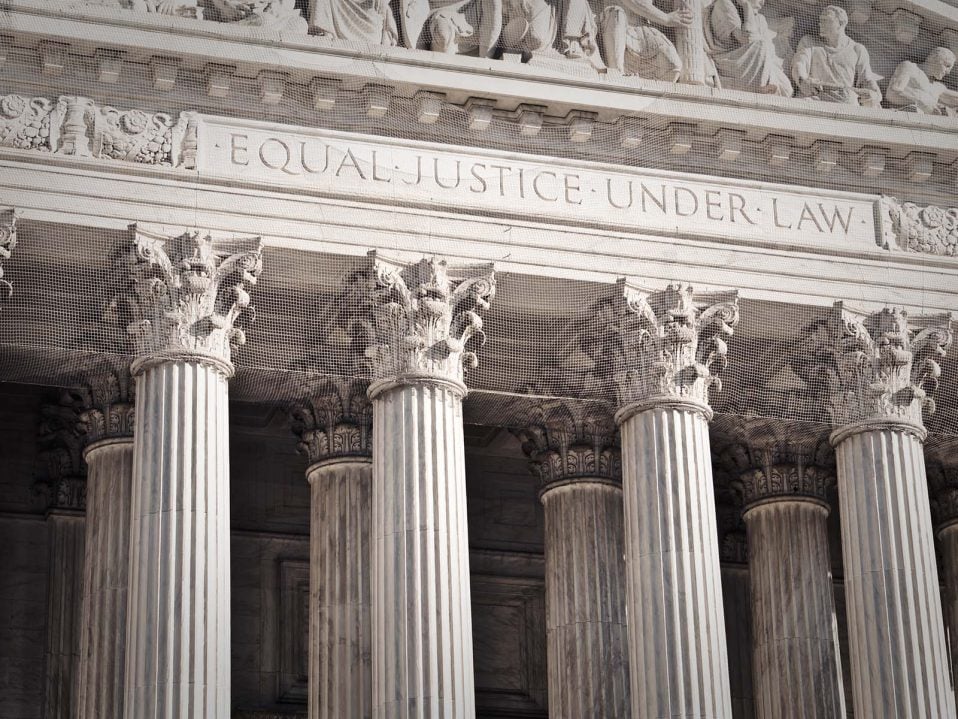Washington, D.C.—The nonreligious civil rights watchdog organization American Atheists is urging the Supreme Court to protect the free speech rights of atheists—and all Americans—to challenge Christian nationalist lawmakers and other government officials on social media.
“Atheists are the most politically active group in America, and we have just as much of a right to challenge Christian nationalist lawmakers online as we do in person,” said Geoffrey T. Blackwell, Litigation Counsel for American Atheists. “Yet time and time again, government officials deny us our freedom of speech when they block us from their official social media accounts or delete our comments challenging their views.”
More specifically, American Atheists is asking the Justices to establish a clear standard for determining whether a government official’s social media posts are personal or governmental, as the organization laid out in its amicus brief on Lindke v. Freed. The lower-level circuit court rulings are contradictory and have established different criteria for when to consider social media posts private or official, the brief explains. Currently, American Atheists and other free-speech defenders, as well as government officials themselves, must go through burdensome litigation to know whether a post creates an official government forum for free speech purposes or not.
“People should be able to know, when they speak, whether or not that speech is protected by the First Amendment,” said Blackwell, who wrote the amicus brief. “The current situation is confusing, unworkable, and chills free speech.”
In 2016, American Atheists filed a free speech lawsuit against Bradley County, Tennessee, and the Bradley County Sheriff’s Office. The sheriff told a local newspaper that he planned to use his position as sheriff to proselytize. After the sheriff’s office posted the newspaper article on its governmental Facebook page, commenters began criticizing the sheriff’s statements. The sheriff and employees of the department began blocking critics and deleting negative comments while keeping favorable comments on the Facebook page. Ultimately, Bradley County agreed to settle the lawsuit, paying a total of $15,000 in damages to American Atheists and the local plaintiffs, Joshua Stevens and Jane Doe, for interfering with their right to freedom of speech, as well as $26,000 in attorney’s fees.
In 2019, American Atheists filed another free speech lawsuit, this time against Christian nationalist lawmaker Jason Rapert, an Arkansas state senator at the time. The organization represented its members in Arkansas, including four individual plaintiffs, whom Rapert unconstitutionally blocked from his official Facebook and Twitter accounts after they criticized his positions on several issues, including abortion and government endorsements of Christianity. In 2022, American Atheists announced a successful settlement against Rapert. As part of the agreement, the state of Arkansas paid American Atheists more than $16,000, and Rapert was forced to immediately unblock the plaintiffs from his official social media accounts.
“Blocking atheists from official government forums created on social media is discrimination, pure and simple,” said Alison Gill, Vice President for Legal and Policy at American Atheists. “When officials use their social media to conduct government business and create forums to receive feedback from constituents, those forums must be open to everyone, not just those who agree with the officials’ religion or policy positions.”
In 2019, American Atheists conducted the U.S. Secular Survey, which canvassed nearly 34,000 nonreligious Americans. The resulting report, Reality Check: Being Nonreligious in America, co-written by Gill, found that anti-atheist stigma was widespread, including on the Internet. 58.3% of participants reported negative experiences because of their nonreligious identity when using social media or commenting online. Those who reported these negative experiences were 39.0% more likely to screen positive for depression, the report found.
“The Supreme Court has called social media platforms ‘the modern public square’ and ‘perhaps the most powerful mechanisms available to a private citizen to make his or her voice heard.’ The Justices face a choice: will they keep online speech as free as in-person speech, or will they contradict the Court’s previous statements and harm freedom of expression?” asked Nick Fish, president of American Atheists. “Atheists will continue to challenge Christian nationalist lawmakers. The question is whether the Supreme Court will establish a principle that helps or harms online free speech.”







